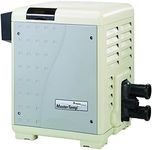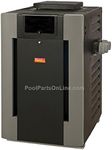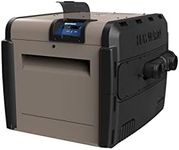We Use CookiesWe use cookies to enhance the security, performance,
functionality and for analytical and promotional activities. By continuing to browse this site you
are agreeing to our privacy policy
Best Natural Gas Pool Heaters
From leading brands and best sellers available on the web.#2

Raypak
Raypak 009217 Pr266Aenc50 - 266000 BTU Electronic NG Heater
View Product
#3

Pentair
PENTAIR MASTER TEMP POOL HEATER NATURAL LOW NOx 200BTU
View Product
#4

Raypak
Raypak PR206AENC50 206,000 BTU in-Ground Natural Gas Heater
View Product
Buying Guide for the Best Natural Gas Pool Heaters
Choosing a natural gas pool heater can make a big difference in how comfortable and enjoyable your pool is throughout the year. The right heater will keep your water at a pleasant temperature, extend your swimming season, and work efficiently for your pool size and climate. To find the best fit, it's important to understand the main features and specifications that affect performance, efficiency, and ease of use. By learning what each key spec means and how it relates to your needs, you can confidently select a heater that will serve you well for years.BTU Output (Heating Capacity)BTU stands for British Thermal Unit, and it measures how much heat the heater can produce. The higher the BTU rating, the faster and more effectively the heater can warm your pool water. Small pools or spas may only need a lower BTU output, while larger pools or those in colder climates will benefit from a higher BTU heater. To pick the right BTU level, consider your pool's size, how quickly you want it heated, and your local climate. If you want to heat the pool quickly or keep it warm during cooler months, a higher BTU output is better. For smaller pools or occasional use, a lower BTU heater may be sufficient.
Energy Efficiency (Thermal Efficiency Percentage)Energy efficiency tells you how much of the gas consumed is actually turned into heat for your pool, usually shown as a percentage. A higher efficiency means less wasted energy and lower operating costs. Heaters typically range from about 82% to 96% efficiency. If you use your pool often or want to save on gas bills, look for a higher efficiency model. For occasional use or if energy costs are less of a concern, a standard efficiency heater may be enough.
Ignition TypeIgnition type refers to how the heater starts up. The two main types are electronic ignition and pilot light. Electronic ignition only lights when needed, saving energy and being safer, while a pilot light stays on all the time. If you want convenience and better energy savings, electronic ignition is a good choice. If you prefer a simpler, always-ready system and don't mind a small, constant gas use, a pilot light may suit you.
Corrosion Resistance (Heat Exchanger Material)The heat exchanger is the part of the heater that transfers heat to the pool water, and its material affects how well it resists corrosion from pool chemicals and salt. Common materials are copper and cupro-nickel, with cupro-nickel offering better resistance, especially for saltwater pools or pools with high chemical use. If your pool uses saltwater or you want a longer-lasting heater, choose a model with a cupro-nickel heat exchanger. For standard, freshwater pools, copper may be sufficient.
Size and Installation RequirementsThe physical size of the heater and its installation needs are important to ensure it fits your available space and meets local codes. Some heaters are more compact and easier to install in tight spaces, while others need more room for ventilation and access. Before buying, check the space where you plan to install the heater and make sure the model you choose will fit and can be installed safely. If you have limited space or specific installation needs, look for a compact or versatile model.
Control System (User Interface)The control system is how you set and adjust the heater's temperature and settings. Some heaters have simple manual dials, while others offer digital displays and programmable controls. If you want easy, precise control or plan to integrate the heater with a pool automation system, look for a model with a digital or smart control panel. For basic needs, a manual control may be all you need.





